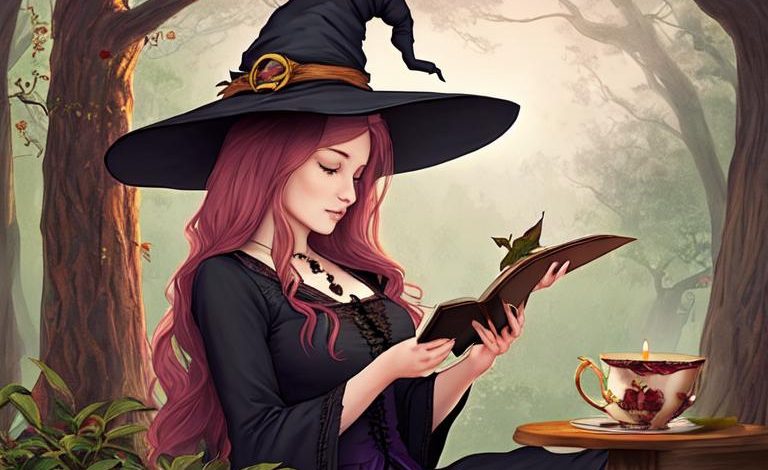
Tea leaf divination, also known as tasseography, is a fascinating and ancient method of divination that has been used by witches and mystics for centuries. This practice involves interpreting patterns formed by the tea leaves that are left at the bottom of a cup after drinking tea. It is believed that the shape and position of the tea leaves can reveal important insights and messages about the future.
To practice tea leaf divination, witches must first brew a cup of loose leaf tea. Once the tea is ready, it is important to drink it slowly and mindfully, focusing on the intention of gaining insight and guidance from the leaves. When the cup is empty, the remaining tea leaves are carefully swirled around in the cup to form a pattern.
The interpretation of the tea leaves is a highly intuitive process, and it requires the witch to be open to the messages that the leaves are trying to convey. The patterns that form in the tea leaves can take on a wide variety of shapes and forms, and each shape has a unique meaning that can provide insight into the future.
For example, if the tea leaves form a clear image of a heart, this can indicate that a romantic relationship is on the horizon. Alternatively, if the tea leaves form a snake or a spider, this can indicate that a potential danger or obstacle is looming in the future.
Tea leaf divination can also reveal information about a person’s past, present, and future. The position of the tea leaves in the cup can indicate which part of a person’s life the message is related to. Leaves that are clustered towards the rim of the cup may represent the past, while leaves that are concentrated in the bottom of the cup may represent the future.
Interpreting the tea leaves also involves taking into account the overall mood and energy of the reading. The atmosphere in the room, the feelings and intentions of the witch, and even the weather outside can all play a role in shaping the meaning of the tea leaves.
One of the most important aspects of tea leaf divination is the ability to trust one’s intuition. The practice is not an exact science, and it relies heavily on the witch’s ability to tap into their own intuition and interpret the messages that are being conveyed.
To improve their skills in tea leaf divination, witches can practice by conducting readings for themselves and others. It is important to keep a record of each reading and to reflect on the accuracy of the messages that were received. Over time, witches may begin to notice patterns in the tea leaf shapes and develop a deeper understanding of the meanings behind them.
Tea leaf divination can also be combined with other forms of divination, such as tarot readings or astrology, to provide a more comprehensive picture of the future. For example, if the tea leaves indicate that a new romantic relationship is on the horizon, this information can be combined with a tarot reading to gain more insight into the potential outcome of the relationship.
There are many different types of tea that can be used for tea leaf divination, and each type of tea has its own unique properties and meanings. For example, black tea is often associated with strength and stability, while green tea is associated with growth and renewal. Herbal teas, such as chamomile and lavender, are often used for their calming and soothing properties.
In addition to being a powerful tool for divination, tea leaf divination can also be a relaxing and enjoyable practice in its own right. The act of sipping tea mindfully and reflecting on the patterns that form in the leaves can be a meditative experience that helps to calm the mind and reduce stress.
For witches who are new to tea leaf divination, it can be helpful to seek out guidance and support from more experienced practitioners. There are many online communities and forums where witches can connect with other practitioners and share tips and insights about tea leaf divination. Additionally, there are many books and resources available that provide detailed information about the history and practice of tea leaf divination.
It is important for witches to approach tea leaf divination with respect and reverence for the practice and the messages that the leaves may reveal. This includes taking care to choose high-quality tea leaves and to brew the tea mindfully and with intention. It is also important to approach each reading with an open mind and a willingness to accept the messages that the leaves convey, even if they may be unexpected or challenging.
Tea leaf divination is just one of many powerful tools that witches can use to gain insight and guidance from the universe. By practicing this ancient art with intention and an open heart, witches can tap into their intuition and unlock hidden truths about their past, present, and future. Whether used alone or in combination with other forms of divination, tea leaf divination is a valuable practice that can help witches to navigate the challenges and uncertainties of life with greater clarity and confidence.
In addition to the practical benefits of tea leaf divination, the practice also holds a deep spiritual significance for many witches. It is believed that the leaves themselves contain a powerful energy that can be harnessed and channeled for divinatory purposes. By connecting with this energy and interpreting the messages that it conveys, witches can gain a deeper understanding of their place in the universe and the paths that lay before them.
Tea leaf divination can also be used to deepen one’s connection to the natural world. The act of brewing and drinking tea is a reminder of the many gifts that the earth provides, and the leaves themselves are a symbol of the cycles of growth and decay that are present in all aspects of life. By engaging with these natural rhythms and energies, witches can develop a deeper sense of harmony and balance in their lives.
As with any form of divination, tea leaf reading is not without its skeptics and critics. Some may dismiss the practice as nothing more than a superstition or a parlor trick. However, for those who have experienced the power and insight that can be gained through tea leaf divination, the practice is much more than that. It is a way of connecting with the universe and accessing the hidden truths that lie within.
Ultimately, the value of tea leaf divination lies in its ability to provide guidance and insight to those who seek it. Whether used for personal growth, spiritual connection, or simply as a source of comfort and guidance, tea leaf reading is a powerful tool that can help witches to navigate the complexities of life with greater ease and clarity. By approaching the practice with respect and reverence, and by trusting in the messages that the leaves reveal, witches can unlock new depths of insight and understanding that can help them to achieve their goals and fulfill their destinies.
A Tea Leaf Reading

Before beginning a tea leaf divination reading, it is important to set the intention for the session. This can be done through prayer, meditation, or any other method of grounding and centering. Once the intention has been set, the tea should be brewed mindfully, with attention paid to the quality of the water, the temperature of the brew, and the timing of the steeping process.
When the tea is ready, it should be poured into a wide, shallow cup or bowl. The person receiving the reading should then sip the tea while focusing on their question or intention. Once the tea has been consumed, the cup should be swirled three times in a clockwise direction before being turned upside down on a saucer or plate.
The leaves that remain in the cup will form patterns and shapes that can be interpreted by the reader. Some common symbols that may appear include hearts (indicating love or romance), birds (representing freedom and flight), and spirals (symbolizing change and transformation). The reader will interpret the symbols based on their intuition and experience, as well as any guidance they may receive from their spiritual guides or ancestors.
It is important to approach tea leaf divination with an open mind and a willingness to accept whatever messages the leaves may reveal. Sometimes the messages may be difficult or challenging, but it is important to trust that they are being revealed for a reason. With practice and experience, tea leaf readers can learn to discern the subtler meanings behind the symbols and patterns, and to use this insight to guide their own lives and the lives of others.
In addition to traditional tea leaf reading, there are also many variations and adaptations of the practice that witches may wish to explore. For example, some readers may use specific blends of tea to focus on different aspects of life (such as love, prosperity, or health), while others may incorporate additional tools or rituals into their readings, such as candles, crystals, or prayer beads.
Another variation of tea leaf reading is called tasseomancy, which involves using a teacup or other specialized vessel to read the leaves. This method is often associated with Turkish and Middle Eastern cultures, and involves brewing the tea in a special pot and then pouring it into a specially designed cup with a wide, flared rim. The cup is then swirled and turned over onto a saucer, and the patterns and shapes that are revealed in the leaves are interpreted by the reader.
Regardless of the specific method or tradition used, tea leaf divination is a powerful tool that can help witches to gain insight and guidance from the universe. Whether used alone or in combination with other forms of divination, tea leaf reading is a valuable practice that can help witches to navigate the challenges and uncertainties of life with greater clarity and confidence. By approaching the practice with respect, reverence, and an open heart, witches can tap into the deep wisdom and insight that tea leaf divination has to offer, and use this knowledge to transform their lives and the lives of those around them.
For those who are new to tea leaf divination, there are many resources available that can help to guide the practice. Books, online courses, and workshops can all be valuable tools for learning about the symbols and interpretations used in tea leaf reading, as well as the best techniques for brewing and preparing the tea itself.
It is also important to seek out a trusted and experienced tea leaf reader who can offer guidance and insight. Many witches offer tea leaf divination readings as part of their services, and these individuals can be valuable resources for those seeking to deepen their understanding of the practice.
In addition to seeking out guidance from others, it is also important for witches to develop their own intuition and connection to the universe. By spending time in nature, practicing meditation and visualization, and cultivating a sense of mindfulness and awareness, witches can strengthen their ability to receive and interpret the messages that the universe is sending them.
Tea leaf divination is a powerful and versatile tool that can be used in a wide variety of contexts. Whether seeking guidance in matters of love, career, health, or spirituality, tea leaf reading can provide valuable insight and perspective on the challenges and opportunities that lie ahead.
For those who are seeking to deepen their connection to the natural world, tea leaf divination can be a powerful practice for cultivating a sense of harmony and balance in one’s life. By connecting with the energy of the leaves and the universe itself, witches can gain a deeper understanding of their place in the world and their relationship to the cycles of growth and decay that are present in all aspects of life.
Overall, tea leaf divination is a powerful tool that can help witches to navigate the challenges and uncertainties of life with greater insight and understanding. By approaching the practice with an open heart, a willingness to learn, and a deep sense of respect and reverence for the universe, witches can unlock new depths of wisdom and insight that can help them to achieve their goals and fulfill their destinies.
Tea Leaf Symbos & Their Meanings
Symbol | Meaning |
|---|---|
Anchor | A symbol of stability and security |
Apple | Symbolizes health and prosperity |
Arrow | Signifies a change in direction or path |
Bird | Represents freedom, joy, and good news |
Book | Symbolizes knowledge and learning |
Butterfly | Signifies transformation and growth |
Candle | Indicates guidance and inspiration |
Castle | A symbol of protection and safety |
Cat | Signifies independence and mystery |
Clock | Symbolizes the passage of time and the need to make the most of it |
Clouds | Signify change and uncertainty |
Crown | A symbol of power and authority |
Cup | Represents emotions and relationships |
Dagger | Signifies danger or conflict |
Dolphin | A symbol of joy, playfulness, and communication |
Dragon | Signifies power, strength, and wisdom |
Eagle | A symbol of courage and freedom |
Elephant | Symbolizes strength and perseverance |
Eye | Represents insight and intuition |
Feather | Signifies lightness and freedom |
Fish | Symbolizes abundance and fertility |
Flower | Represents growth, beauty, and new beginnings |
Frog | Signifies transformation and the need for adaptability |
Garland | A symbol of celebration and joy |
Grapes | Signify abundance and fertility |
Hammer | A symbol of strength and hard work |
Hand | Signifies assistance, guidance, and protection |
Heart | Represents love and relationships |
House | Symbolizes home, family, and security |
Hourglass | Signifies the passage of time and the need to make the most of it |
Key | A symbol of opportunity and access |
Ladder | Signifies progress and growth |
Leaf | Represents renewal, growth, and abundance |
Lion | Symbolizes strength and courage |
Moon | Signifies intuition, emotions, and the divine feminine |
Mountain | Represents obstacles and challenges |
Owl | Symbolizes wisdom, intuition, and secrets |
Palm Tree | Signifies growth, strength, and endurance |
Pencil | A symbol of creativity and inspiration |
Phoenix | Represents rebirth and transformation |
Pineapple | A symbol of hospitality and friendship |
Rainbow | Signifies hope, joy, and new beginnings |
Ring | Represents commitment and partnership |
Rose | A symbol of love and beauty |
Scissors | Signify separation and division |
Shell | Represents the ocean and the mysteries of the deep |
Ship | Signifies adventure, travel, and exploration |
Snake | Symbolizes transformation and rebirth |
Spider | A symbol of creativity, weaving, and magic |
Star | Signifies inspiration, hope, and the divine |
Sun | Represents power, energy, and vitality |
Swan | A symbol of grace, beauty, and transformation |
Sword | Signifies action, conflict, and the need for courage |
Tree | Represents growth, stability, and grounding |
Turtle | Symbolizes longevity, patience, and wisdom |
Unicorn | A symbol of purity, magic, and inspiration |
Vase | Signifies creativity, beauty, and art |
Violin | Represents music, inspiration, and creativity |
Water | Symbolizes emotions, intuition, and flow |
Whale | Signifies strength, wisdom, and intuition |
Wheel | Represents change, progress, and evolution |
Windmill | A symbol of creativity, productivity |
Wings | Signify freedom, spirituality, and elevation |
Wolf | A symbol of loyalty, courage, and protection |
Woman | Represents femininity, intuition, and nurturing |
Yin Yang | Represents balance, harmony, and the interdependence of opposites |
Zebra | Symbolizes individuality, uniqueness, and balance between light and dark |
Zodiac signs | Each sign has its own unique symbolism and meaning, corresponding to the traits and characteristics of that sign |




